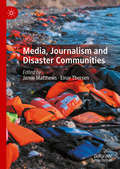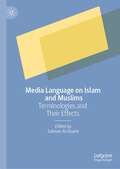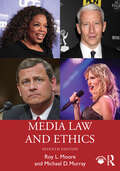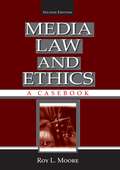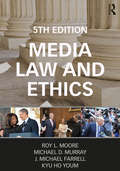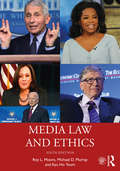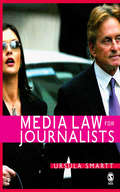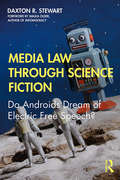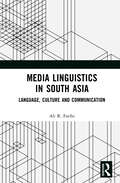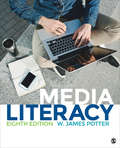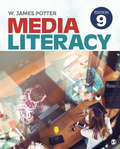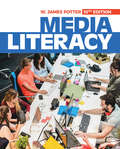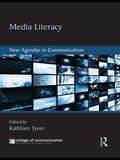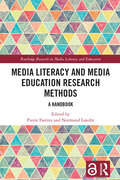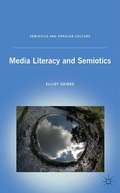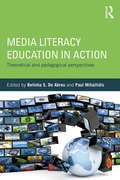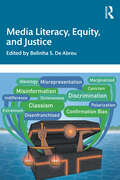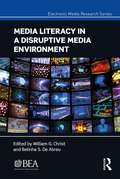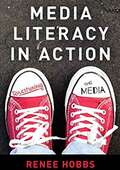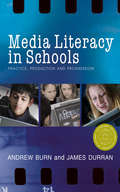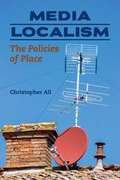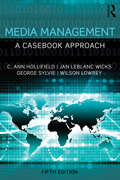- Table View
- List View
Media, Journalism and Disaster Communities
by Einar Thorsen Jamie MatthewsThis book illuminates the concept of disaster communities through a series of international case studies. It offers an eclectic overview of how different forms of media and journalism contribute to our understanding of the lived experiences of communities at risk from, affected by, and recovering from disaster. This collection considers the different forms of media and journalism produced by and for communities and how they may recognise and speak to the different notions of community that emerge in disaster contexts – including vulnerabilities and consequences that arise from environmental destruction and geophysical hazards, the insecurity created by armed conflict and limitations on journalistic freedoms, and result from human (in)action and humanitarian crises.
Media Language on Islam and Muslims: Terminologies and Their Effects
by Salman Al-AzamiThis book brings together contributions from ten academics and a commentary from a Muslim community leader on how the British media represent some of the most important terminologies related to Islam and Muslims. It takes a nuanced approach to language within Muslims in the media research by focusing on terminologies. Each contributor in this volume focused on one terminology and its associated words to show how the representation of these terminologies have major implications on the lives of British Muslims. The book also includes some key recommendations on the usage of these terms from the Media Style Guide of the Centre for Media monitoring - a research organisation of the Muslim Council of Britain. This book’s link with the Muslim community can be a step towards new approaches in this field where academics will engage with communities and practitioners to ensure better impact of their academic works. This book will be of interest to students, scholars and practitioners in a range of fields, including Journalism, Media and Communication Studies, English Language and Linguistics, Sociology, Cultural and Religious Studies.
Media Law and Ethics
by null Roy L. Moore null Michael D. MurrayThis fully revised seventh edition provides a thorough introduction to both the legal and ethical considerations relevant to students pursuing careers in media, law and communication.This comprehensive textbook integrates fundamental legal and ethical principles with cases and examples from both landmark moments and recent history. It incorporates discussion of new technologies and media throughout its coverage of core topics such as intellectual property, defamation and commercial speech. This edition introduces readers to media law in comparative international communication and explores topics such as data mining, artificial intelligence and the dark web. Coverage of recent court cases and congressional hearings bring readers up to date on the evolving discussion surrounding Facebook, X (formerly Twitter), TikTok and today’s other major online sources.This hybrid textbook is ideal for undergraduate and graduate courses in media and communication that combine law and ethics.Online resources, including sample syllabi and a test bank, are available at www.routledge.com/9781032612928.
Media Law and Ethics: A Casebook
by Roy L. MooreThis new edition of the casebook includes extensive excerpts from 25 major decisions by the Supreme Court of the United States in media law or related to media law. The cases are presented in the order in which they are discussed in the third edition of Media Law and Ethics by Roy L. Moore and Michael D. Murray, but the casebook is designed to be used as a supplemental text in any media law course. Each case includes a brief overview and has been edited to delete detailed citations and highly technical material. However, every effort has been made to preserve the Court's original language, including its recitation of the facts, its reasoning and the holding in the case. Most of the cases also include excerpts from the Court's syllabus, a summary prepared by the Court's Reporter of Decisions. A few of the cases include excerpts from concurring and/or dissenting opinions, where those opinions illustrate the complexity of the case or were influential in later decisions.
Media Law and Ethics (Routledge Communication Series)
by Roy L. Moore Michael D. Murray Mike Farrell Kyu Ho YoumMedia Law and Ethics is a comprehensive overview and a thoughtful introduction to media law principles and cases as well as related ethical concerns relevant to the practice of professional communication. This is the fi rst textbook to explicitly integrate both media law and ethics within one volume. Since it integrates both current law and ethical queries, it is ideal for both undergraduate and graduate courses in media law and ethics. Co-author Kyu Ho Youm expands this edition’s international scope, updating and broadening his chapter on international and foreign law. The book also covers the most timely and controversial issues in modern American media. The new fi fth edition has been updated with current events and discusses the potential impact they have.
Media Law and Ethics: A Casebook
by Roy L. Moore Michael D. Murray Kyu Ho YoumThis comprehensive textbook provides a thoughtful introduction to both the legal and ethical considerations relevant to students pursuing careers in communication and media. The fully revised, sixth edition continues to integrate fundamental legal and ethical principles with cases and examples from both landmark moments and recent history. It expands upon the previous edition's exploration of international and non-U.S. law, introduces a new chapter on digital and social media, and incorporates discussion of new technologies and media throughout its coverage of core topics such as privacy, intellectual property, defamation and commercial speech. Coverage of recent court cases and congressional hearings brings readers up to date on the evolving discussion surrounding Facebook, Twitter and today’s other major online players. This hybrid textbook is ideal for undergraduate and graduate courses in media and communication that combine law and ethics. Online resources including chapter PowerPoint slides, study guides and sample teaching materials are available at www.routledge.com/cw/moore
Media Law for Journalists
by Mrs Ursula Smartt'A refreshing complement to more venerable textbooks. Indeed, being both reflective and accessible, it is arguably a better first resort for aspirant hacks' Times Higher Education Supplement 'It is written in a clear and user-friendly style, avoiding the legalistic language that can be a problem with so many law textbooks. Particularly well written are the case studies that Ursula Smartt explains in each chapter' - Writing Magazine Media Law for Journalists functions as both an introduction and a reference guide to the main legal issues facing journalists. It is intended as a course textbook for students, first and foremost. However, it is also intended to help keep journalists out of jail and on the right side of the law. The book presumes no prior legal knowledge, but covers all the relevant areas including: defamation, privacy, contempt of court, freedom of expression, and intellectual property. It also looks at the difference between the English and Scottish legal systems as they pertain to the media. This book will be essential reading for all students of journalism as well a welcome guide to professional journalists.
Media Law Through Science Fiction: Do Androids Dream of Electric Free Speech?
by Daxton R. StewartAttorney and legal scholar Daxton Stewart examines the intersection of media law and science fiction, exploring the past, present, and future of communication technology and policy debates. Science fiction offers a vast array of possibilities anticipating future communication technologies and their implications on human affairs. In this book, Stewart looks at potential legal challenges presented by plausible communication technologies that may arise 20 or 50 or 100 years from today. Performing what he calls "speculative legal research," Stewart identifies the kinds of topics we should be talking about relating to speech, privacy, surveillance, and more, and considers the debates that would be likely to arise if such technologies become a reality. Featuring interviews with prominent science fiction authors and legal scholars, and a foreword by Malka Older, this book considers the speculative solutions of science fiction and their implications in law and policy scholarship. Chapters feature specific literary examples to examine how cultural awareness and policy creation are informed by fictional technology, future societies, and legal disputes. Looking forward, beyond traditional legal research and scholarship to the possible and even very likely future of communication technology, this fascinating work of speculative legal research will give students and scholars of media law, science fiction, and technology much to discuss and debate.
Media Linguistics in South Asia: Language, Culture and Communication
by Ali R FatihiThe tone and texture of the language of media have changed considerably due to the rapid expansion of media in recent times and advancements in communication technologies. This book examines new ways to conduct linguistic explorations into the myriad of forms news is being presented and consumed. The volume contributes to the emerging field of media linguistics by measuring and analysing the associations between linguistics and the news discourse. It extends the conceptualization of language-media relations in sociolinguistics beyond the notions of ‘influence’ and ‘effect’ and broadens the theoretical and empirical scope of the discipline. The author discusses different perspectives of media linguistics; issues of variation in language of media; question of plurilingual resources; parallel language use in media and textuality of news genres. He further analyses the dynamics of news reportage by studying the coverage of conflicts, violence and dissent in South Asian media in recent decades along with the reportage of cricket headlines and news. Comprehensive and topical this volume will be useful for scholars and researchers of linguistics, media linguistics, applied linguistics, media studies, media sociology, sociology, cultural studies and South Asian studies.
Media Literacy
by Dr W. James PotterIn this media-saturated world, we must learn how to navigate through the overwhelming flood of information so we can avoid the risks and maximize its potential to help us. Media Literacy, Eighth Edition shows readers how. Drawing from thousands of media literature studies, bestselling author W. James Potter explores the key components to understanding the fascinating world of mass media. In this updated, revised, and reorganized new edition, Potter presents numerous examples and facts for readers to understand how the media operate, how they attract attention, and how they influence us on a day-to-day basis.
Media Literacy
by Dr W. James PotterIn this media-saturated world, we must learn how to navigate through the overwhelming flood of information so we can avoid the risks and maximize its potential to help us. Media Literacy, Eighth Edition shows readers how. Drawing from thousands of media literature studies, bestselling author W. James Potter explores the key components to understanding the fascinating world of mass media. In this updated, revised, and reorganized new edition, Potter presents numerous examples and facts for readers to understand how the media operate, how they attract attention, and how they influence us on a day-to-day basis.
Media Literacy
by Dr W. James PotterMedia Literacy teaches readers how to navigate through the overwhelming flood of information found in today’s media-saturated world. Drawing from thousands of media research studies, author W. James Potter explores the key components to understanding the fascinating world of mass media. Potter presents numerous examples and facts to help readers understand how the media operate, how they attract attention, and how they influence the public. The Ninth Edition has been thoroughly updated to evolve with the ever-changing media landscape and features a new chapter on fake news, debating what we as news consumers can do to recognize fake news in order to avoid its influence. Each chapter concludes with a set of exercises to help readers apply the chapter material to everyday life and engage in a step-by-step process to increase their own media literacy.
Media Literacy
by Dr W. James PotterMedia Literacy teaches readers how to navigate through the overwhelming flood of information found in today’s media-saturated world. Drawing from thousands of media research studies, author W. James Potter explores the key components to understanding the fascinating world of mass media. Potter presents numerous examples and facts to help readers understand how the media operate, how they attract attention, and how they influence the public. The Ninth Edition has been thoroughly updated to evolve with the ever-changing media landscape and features a new chapter on fake news, debating what we as news consumers can do to recognize fake news in order to avoid its influence. Each chapter concludes with a set of exercises to help readers apply the chapter material to everyday life and engage in a step-by-step process to increase their own media literacy.
Media Literacy
by W. James PotterMedia Literacy teaches students how to navigate through the overwhelming flood of information found in today’s media-saturated world. Drawing from thousands of media research studies, author W. James Potter explores key components to understanding the fascinating world of mass media. Potter presents examples and facts to help students understand how the media operate, how they attract attention, and how they influence the public. Chapters conclude with exercises to help readers apply the material to everyday life and improve their media literacy. The Tenth Edition integrates a stronger focus on digital media, features a streamlined organization, and updates facts to keep readers informed on the rapidly changing media phenomenon.
Media Literacy
by W. James PotterMedia Literacy teaches students how to navigate through the overwhelming flood of information found in today’s media-saturated world. Drawing from thousands of media research studies, author W. James Potter explores key components to understanding the fascinating world of mass media. Potter presents examples and facts to help students understand how the media operate, how they attract attention, and how they influence the public. Chapters conclude with exercises to help readers apply the material to everyday life and improve their media literacy. The Tenth Edition integrates a stronger focus on digital media, features a streamlined organization, and updates facts to keep readers informed on the rapidly changing media phenomenon.
Media Literacy: New Agendas in Communication (New Agendas in Communication Series)
by Kathleen TynerThis volume explores how educators can leverage student proficiency with new literacies for learning in formal and informal educational environments. It also investigates critical literacy practices that can best respond to the proliferation of new media in society. What sorts of media education are needed to deal with the rapid influx of intellectual and communication resources and how are media professionals, educational theorists, and literacy scholars helping youth understand the possibilities inherent in such an era? Offering contributions from scholars on the forefront of media literacy scholarhip, this volume provides valuable insights into the issues of literacy and the new forms of digital communication now being utilized in schools. It is required reading for media literacy scholars and students in communication, education, and media.
Media Literacy and Media Education Research Methods: A Handbook (Routledge Research in Media Literacy and Education)
by Pierre Fastrez Normand LandryThis handbook interrogates the foundations of media literacy and media education research from a methodological standpoint. It provides a detailed, illustrated overview of key methods used in the study of media literacy and media education. Further, it reveals the diversity of this research field and organizes this diversity by using three categories of investigation: media practices, educational initiatives, and prescriptive discourses. The book offers valuable reference points and tools for exploring the range of research methods used to study media literacy and media education and how these methods connect to epistemological stances, theoretical frameworks, and research questions. It serves as a guide for researchers who wish to position themselves, reflect on the methods they use or are considering using, and compare and contrast them against alternative or complementary approaches. After reading this book, readers will be better able to identify and define the objects of study in media literacy and media education research, the preferred ways of conducting investigations, the phenomena, issues, and dimensions that these are likely to bring to light, and the knowledge that they generate. This comprehensive and up-to-date overview of the field of media literacy education research methods will be of great interest to scholars and students of education studies, media studies, media literacy, cognitive science, and communication studies. Chapter 2 of this book is freely available as a downloadable Open Access PDF at http://www.taylorfrancis.com under a Creative Commons Attribution (CC-BY) 4.0 International license.
Media Literacy and Semiotics
by Elliot GainesMedia Literacy and Semiotics provides helpful tools to help readers think critically about the meaning of the media images they are exposed to on a daily basis. In this comprehensive book, a basic model of semiotic logic is applied to a variety of media studies to promote critical thinking and media literacy. Elliot Gaines systematically analyzes the hidden meanings in mass-mediated products and texts, and shows how basic meaning structures underlie everything from The Daily Show to television documentaries to infotainment.
Media Literacy Education in Action: Theoretical and Pedagogical Perspectives
by Paul Mihailidis Belinha S. De AbreuMedia Literacy Education in Action brings together the field’s leading scholars and advocates to present a snapshot of the theoretical and conceptual development of media literacy education—what has influenced it, current trends, and ideas about its future. Featuring a mix of perspectives, it explores the divergent ways in which media literacy is connected to educational communities and academic areas in both local and global contexts. The volume is structured around seven themes: • Media Literacy: Past and Present • Digital Media and Learning • Global Perspectives • Public Spaces • Civic Activism • Policy and Digital Citizenship • Future Connections Compelling, well-organized, and authoritative, this one-stop resource for understanding more about media literacy education across disciplines, cultures, and divides offers the fresh outlook that is needed at this point in time. Globally, as more and more states and countries call for media literacy education more explicitly in their curriculum guidelines, educators are being required to teach media literacy in both elementary and secondary education contexts.
Media Literacy, Equity, and Justice
by Belinha S. De AbreuOffering a new and thought-provoking look at media literacy education, this book brings together a range of perspectives that address the past, present, and future of media literacy, equity and justice. Straddling media studies, literacy education, and social justice education, this book comes at a time when the media’s role as well as our media intake and perceptions are being disrupted. As a result, questions of censorship, free speech, accountability abound, and nuance is often lost. This book is an antidote to the challenges facing media literacy education: chapters offer a careful examination of important and hot topics, including AI, authenticity, representation, climate change, activism and more. Addressing the continually evolving role of media and its impact on our society and shared knowledge base, the volume is organized around five themes: Misinformation and Disinformation; Media Representation; Civic Media, Politics and Policy; Eco Media Literacy; Education and Equity, Ethical Quandaries and Ideologies; and Emerging Technologies. Ideal for courses on media literacy and new literacies, this book furthers the conversation on the ways literacy and social justice are connected to educational communities in local and global contexts.
Media Literacy in a Disruptive Media Environment (Electronic Media Research Series)
by William G. Christ Belinha S. De AbreuThis book, part of the BEA Electronic Media Research Series, brings together top scholars researching media literacy and lays out the current state of the field in areas such as propaganda, news, participatory culture, representation, education, social/environmental justice, and civic engagement. The field of media literacy continues to undergo changes and challenges as audiences are reconceptualized and reconfigured, media industries are transformed and replaced, and the production of media texts is available to anyone with a smartphone. The book provides an overview of these. It offers readers specific examples and recommendations to help others as they develop their own teaching and research agendas. Media Literacy in a Disruptive Media Environment will be of great interest to scholars and graduate students studying media literacy through the lens of broadcasting, communication studies, media and cultural studies, film, and digital media studies.
Media Literacy In Action: Questioning The Media
by Renee HobbsThe blurring of entertainment, information, and persuasion is reshaping work, life, and citizenship. As a result, our relationship to media has never been so important nor so complex. By asking critical questions about what they watch, listen to, read, and use, students can be better prepared to be responsible communicators who can use a variety of formats and genres for self-expression and advocacy. Covering a wide range of topics including the rise of news partisanship, algorithmic personalization and social media, stereotypes and media addiction, advertising and media economics, and media influence on personal and social identity, Renee Hobbs helps students develop the lifelong learning competencies and habits of mind needed to navigate an increasingly complex media environment. Rooted in the best practices of media literacy pedagogy, Media Literacy in Action brings an interdisciplinary approach to media studies that engages students with the following features: • full-color layout • engaging questions to stimulate thoughtful dialogue and reflection • contemporary media examples designed to cultivate intellectual curiosity • suggested activities for advancing students’ confidence in oral, written, and multimedia expression • access to videos and multimedia resources at www.medialiteracyaction.com
Media Literacy in Schools: Practice, Production and Progression
by Andrew Burn James DurranIncludes CD-Rom 'Intriguing and timely...I whole heartedly recommend this text to teacher educators and their trainees, certainly across English and the Arts, but arguably to all engaged in considering critical pedagogy across the curriculum' - ESCalate `This is a very timely book, firmly rooted in authentic, albeit visionary, classroom practice, that has much to offer to teachers of all subjects, but should be particularly welcomed by English and media colleagues' - English Drama Media `Heaving with ideas...outstanding lesson ideas and inspiring work from students' - The Secondary English Magazine `I really enjoyed working my way through this book...The book is accompanied by a DVD organised into chapters which correspond to those in the book, and it was great to see the ideas and schemes referred to in the text come alive. The schemes have been included which makes it even easier to adapt the work to fit the technology and resources available in your own school..All teachers of media would benefit from browsing this book' - Learning & Teaching Update This book is for secondary English, Media, and ICT teachers who want to develop practical media work and media literacy across the curriculum. It is ideal for secondary English and media teachers and curriculum leaders in secondary schools, as well as ICT teachers and co-ordinators, PCGE English/Media students, and researchers working on media, English and ICT projects. A range of case studies are presented which show how digital media work, from video editing to computer game authoring, can be developed in schools, drawing on children's own cultural knowledge. It also shows the benefits of such projects in terms of learning outcomes and increased self-esteem for a range of learners. The book comes with a CD-Rom of children's work from the various case study projects, exhibiting the high standard of moving image work, animations and computer games that can be produced with the help of this text. With an integrated approach drawing together practice, theory and research, the book will help teachers to plan for and develop their own media projects in school. It offers advice on integrating media work across the curriculum (in English and media classes as well as in ICT and citizenship), and presents a model of progression which shows how learning can develop from the first years of secondary school through to GCSE level. In line with current government initiatives to open up curriculum boundaries, the book shows how to plan for longer periods of time for these projects.
Media Localism: The Policies of Place (The History of Communication)
by Christopher AliWe live in a boosterish era that exhorts us to play local and buy local. But what does it mean to support local media? How should we define local media in the first place? Christopher Ali delves into our ideas about localism and their far-reaching repercussions for the discourse of federal media policy and regulation. His critique focuses on the new interest in localism among regulators in the United States, the United Kingdom, and Canada. As he shows, the many different and often contradictory meanings of localism complicate efforts to study local voices. At the same time, market factors and regulators' unwillingness to critically examine local media blunt challenges to the status quo. Ali argues that reconciling the places where we live with the spaces we inhabit will point regulators toward effective policies that strengthens local media. That new approach will again elevate local media to its rightful place as a vital part of the public good.
Media Management: A Casebook Approach (Lea’s Communication Series)
by George Sylvie C. Ann Hollifield Wilson Lowrey Jan Leblanc WicksMedia Management: A Casebook Approach provides a detailed consideration of the manager's role in today's media organizations, highlighting critical skills and responsibilities. Using media-based cases that promote critical thinking and problem-solving, this text addresses topics of key concern to managers: diversity, group cultures, progressive discipline, training, and market-driven journalism, among others. The cases provide real-world scenarios to help students anticipate and prepare for experiences in their future careers. Accounting for major changes in the media landscape that have affected every media industry, this Fifth Edition actively engages these changes in both discussion and cases. The text considers the need for managers to constantly adapt, obtain quality information, and be entrepreneurial and flexible in the face of new situations and technologies that cannot be predicted and change rapidly in national and international settings. As a resource for students and young professionals working in media industries, Media Management offers essential insights and guidance for succeeding in contemporary media management roles.
